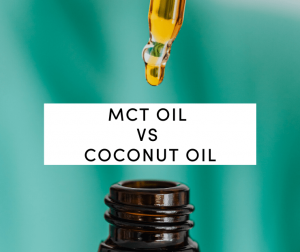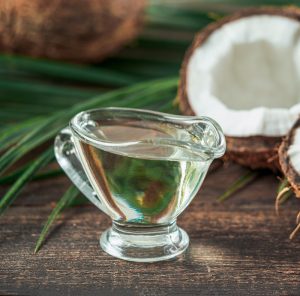MCT Oil vs Coconut Oil
Posted on January 3rd, 2023
Here at Tanasi our tinctures that contain our patent-pending CBD+CBDA 1:1 hemp extracted cannabinoid products also contain MCT oil. Now, MCT oil is a liquid fat created by refining palm or coconut oil. The procedure eradicates and concentrates the medium-chain triglycerides, or MCTs, that naturally exist in the source material. MCT oil may increase ketone production (to help burn fat), mental clarity, and metabolism. Regular coconut oil does offer some of these advantages, but it seems to do so at a reduced level.
Still, because of the other types of fat that exist in coconut oil, it’s ideal for high-heat culinary applications. So, how can you decide which product to use when? Let’s take a look at MCT oil vs. coconut oil and explore their similarities and differences.
MCT Oil vs Coconut Oil: Definition and Explanation 
MCTs
It’s worth noting that both MCT oil and coconut oil consist of MCTs. There are four types of MCTs: lauric acid (C12), capric acid (C10), caprylic acid (C8), and caproic acid (C6). All these fatty acids carry distinct benefits, varying from energy boosts to facilitating metabolism. So, what truly distinguishes MCT oil from coconut oil? The answer lies in their varying MCTs ratios. MCT oil is a great carrier oil for cannabinoid tinctures, and why we choose to use them.
Coconut Oil
There is a long tradition of mixing fragrant coconut oil into everything from soups and baked goods to your morning coffee. Now, coconut oil specifically refers to the oil extracted from the coconut’s kernel. There are many ways to extract this oil, including refined and unrefined techniques. But, regardless of the way it’s extracted, coconut oil is made up of many healthy fats, over 50% of which are MCTs. However, in terms of the ratio of MCTs in coconut oil, there’s a higher proportion of lauric acid (C12). Although some people are still wary of consuming saturated fat, more health experts are embracing the upsides of consuming coconut oil.
What Are the Benefits of Coconut Oil?
- In traditional Polynesian culture, consuming coconut products is associated with improved health, something to note, Polynesions have significantly low heart disease rates than other countries.
- Coconut oil is rich in saturated fat but can improve cholesterol by increasing your HDL levels, which helps eliminate harmful LDL cholesterol from your body.
- Coconut oil is a great natural moisturizer
As you’ve seen, there are plenty of benefits to including coconut oil in your diet. But since most of these effects are tied to the presence of MCTs, you may be better off heading straight to MCT oil.
MCT Oil
MCT products are typically purified coconut oil extractions. They comprise a higher concentration of MCTs (e.g., C8 and C10) than coconut oil. As a result, this concentrated form of fats acts as a very efficient source of energy, making MCT oil a staple of the Keto diet.
The MCTs typically found in MCT oil skip your body’s normal fat digestion process, heading directly to the liver, where they’re metabolized by the body and turned into energy. As a result, MCTs increase your fat-burning abilities and your energy levels, which is why they’re important to Keto diet followers.
And that’s not all: MCT oil has a very unique taste, making it a welcome addition to your favorite smoothies, soups, sauces, and even baked goods. Additionally, people love adding MCT oil to tea and coffee to help them feel full!
What Are the Benefits of MCT Oil?
Here are some suggested MCT oil benefits:
MCT Oil Might Help with Weight Loss
A 2008 study analyzed the effect of MCT vs. olive oil on weight loss for 16 weeks, placing 49 participants between 19-50 years on a weight loss program including identical daily doses of either olive oil or MCT oil. Individuals who received the MCT oil lost more abdominal fat, more weight, and more total body fat. According to researchers, MCT oil might accelerate metabolism and help the body in burning fat more efficiently for energy. As of now, more research is required to determine the right dose of MCT to maximize weight loss.
Supports Ketosis
In the beginning stages, following a ketogenic diet can be challenging as you drastically reduce your carbohydrate intake so your body can start burning ketones instead of carbs for energy. By consuming MCT, you can speed up the process by quickly increasing the levels of ketones in your blood. As a result, the transition to ketosis is much easier. It could also help give you a boost of energy when you’re feeling a little sluggish while on the keto diet.
It Helps You Stay Full
The primary reason why MCTs might support weight loss is that they’re very satiating. So, when you consume MCT oil, it could help you eat less. A 2017 study analyzed the satiating properties of both MCT and coconut oil. Subjects were provided with a smoothie of 205 calories worth of vegetable oil, coconut oil, or MCT oil for breakfast. After three hours, they were offered lunch and were asked to eat as much as they required to feel full. The group that was given the MCT oil ate much less than the other two groups. Plus, they stuck to all day reductions in food intake. Therefore, beginning your day with MCT oil might help control hunger.
Boosts Exercise Performance
The C8 and C10 MCTs are mostly used for energy, which could be very useful during a killer workout. A 2009 study discovered that MCT oil supplication significantly lowers blood lactate, which causes perceived exertion in athletes, and muscle fatigue. As a result, your workouts may feel easier when you take MCT oil, helping you exercise for longer durations.
MCT Oil vs Coconut Oil: How Do You Choose? 
For those who wish to quickly boost cognitive function and fat loss, a daily dose of MCT oil is the best way to go. Undoubtedly, the concentrated MCTs in MCT Creamer or MCT oil will give you more bang for your buck than coconut oil. Also, your system will have an easier time breaking down and processing MCT oil.
When buying MCT oil, make sure to find products with best-quality ingredients. They should not contain artificial flavors, colors, or palm oil, and they should be composed of pure-expeller pressed coconut oil.
Of course, that doesn’t mean you shouldn’t enjoy the benefits of coconut oil: it’s a great source of healthy fat and tastes great in baking and cooking. You just won’t get the concentrated effect of brain-boosting, fat-burning fatty acids that you consume in a tablespoon of MCT oil.
MCT Oil vs Coconut Oil: Risks and Considerations
Coconut oil and MCT oil are both generally well-tolerated and safe for consumption when taken in moderate amounts. However, consuming too much coconut or MCT oil can cause diarrhea, bloating, cramping, and stomach discomfort.
If you’d like to supplement with MCT oil due to its weight loss and ketogenic properties, begin by consuming one tablespoon (15ml) every day and increase as tolerated until the maximum daily dose of 4-7 tablespoons (60-100ml). You could also mix MCT oil into various beverages and foods, including tea, coffee, smoothies, sauces, soups, and hot cereals.
MCT Oil vs Coconut Oil: The Bottom Line
Coconut oil and MCT oil can both be useful – but those uses are different. That’s because MCT oil is a concentrated source of 100% MCTs, making it more effective at enhancing energy production and weight loss, particularly when you’re following a ketogenic diet.
On the other hand, coconut oil contains an MCT content of approximately 54%. It’s mostly used as a cooking oil and might be beneficial for addressing a variety of skin conditions and beauty applications. And guess what? All of our Tanasi tincture products contain a patent-pending blend of CBD+CBDA 1:1 formula as well as MCT oil, so you can boost the effects of your Tanasi routine with this additional supplement. Just visit our online store’s product page to view all our available products.
The reason Tanasi products use MCT oil as a carrier for our CBD+CBDA 1:1 formula is that MCT oil is safe, and has a long shelf life. We always encourage experimentation if you are a first time CBD user. The Tanasi patent-pending University developed hemp extract formula is a one-to-one concentration of Cannabidiolic-acid (CBDA) and Cannabidiol (CBD) alongside a broad or full spectrum formula of other cannabinoids.

Related Posts in MCT Oil
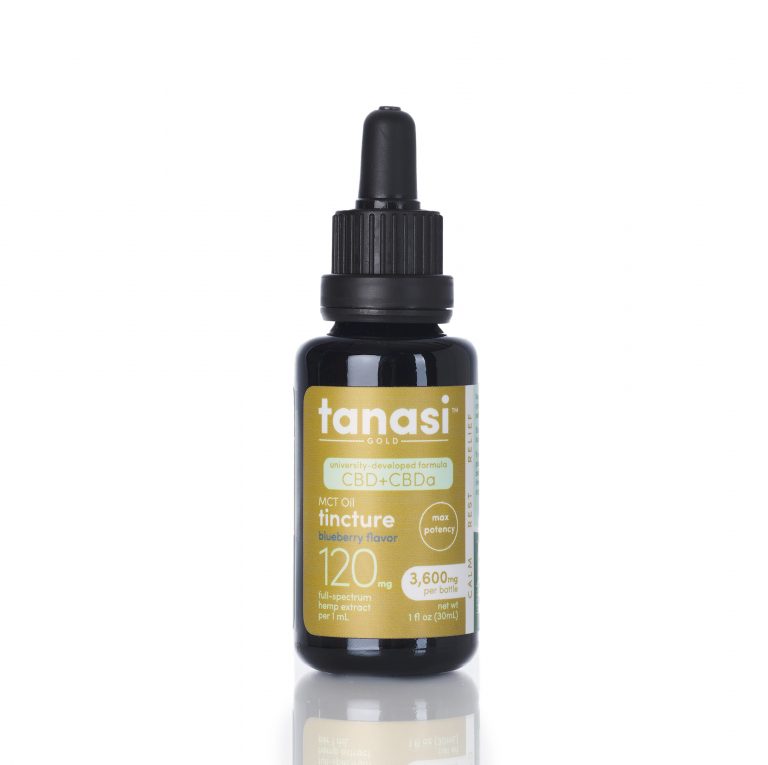
May 3 2023
Does MCT Oil Go Bad? How To Maximize Freshness and Identify Bad Oil
Read More →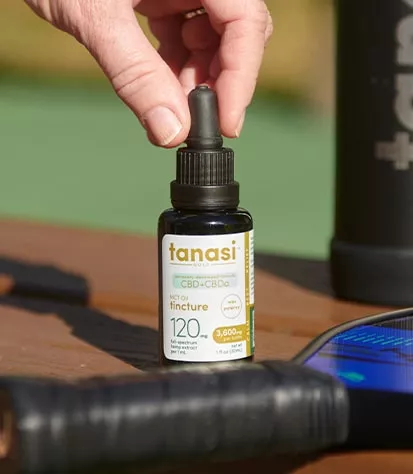
Apr 13 2023
When Is the Best Time to Take MCT Oil with CBD + CBDa?
Read More →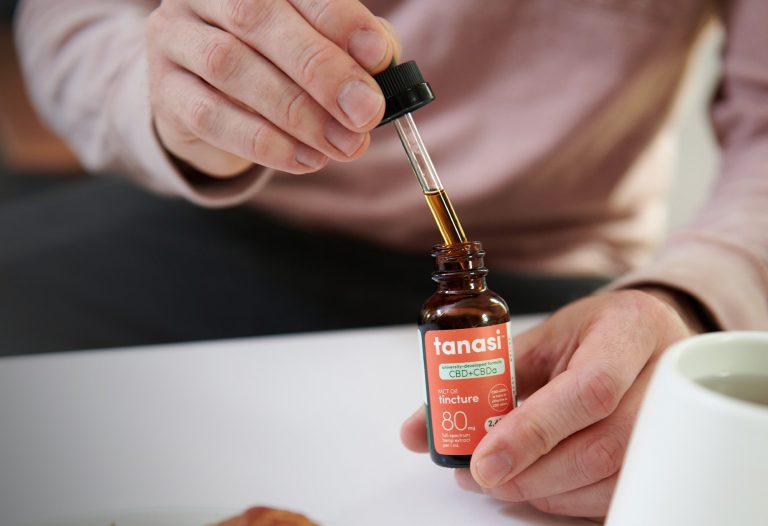
Apr 7 2023
8 MCT Oil Effects: Why Tanasi Chooses This Carrier Oil
Read More →
Mar 21 2023
